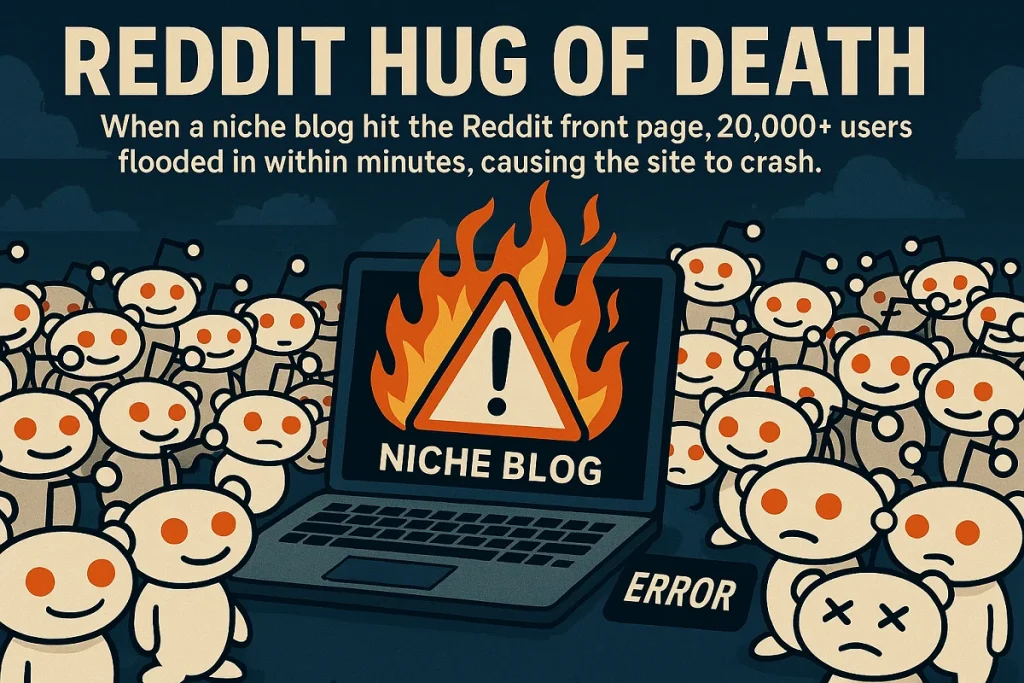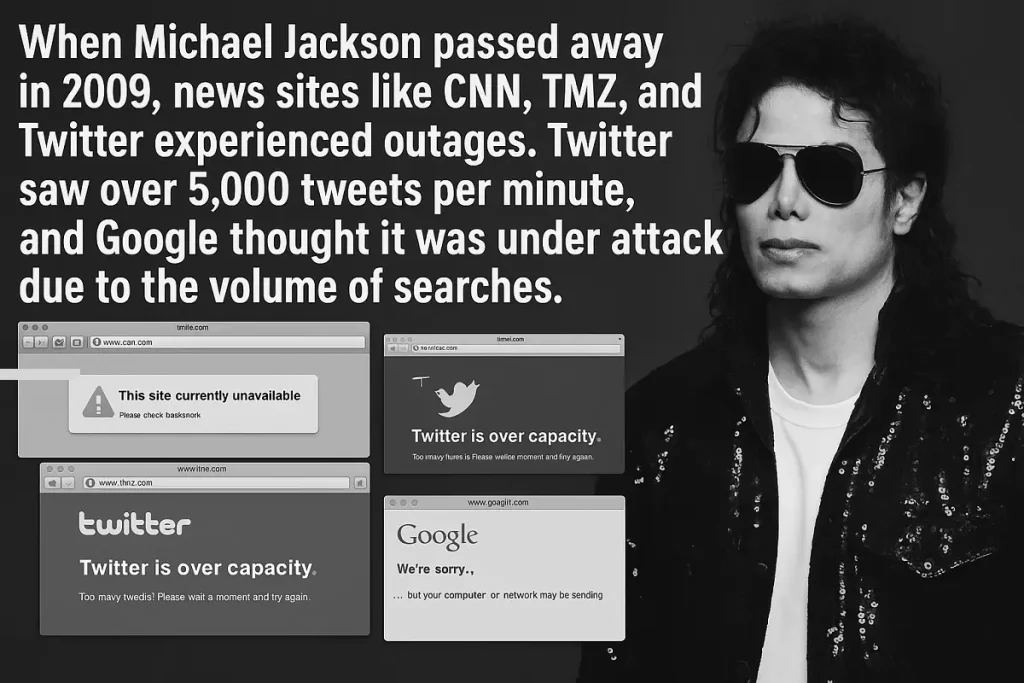Disclosure: We’re reader-supported. When you buy through links on our site, we may earn an affiliate commission at no extra cost to you. For more information, see our Disclosure page. Thanks.
Contents
Can Your Web Host Handle a Viral Traffic Surge? Here’s How to Stress Test Your Hosting Plan
The Real Test of a Hosting Plan Comes When You Go Viral
Imagine this: You wake up to 100,000 visitors flooding your website faster than you can say “viral content.” Your blog post has made its way to Reddit, or maybe a TikTok influencer has shared it, and suddenly, you’re the talk of the internet. Exciting, right?
Except, there’s a catch. Instead of popping champagne, you’re frantically checking your hosting plan like it’s a sinking ship, and your website is lagging, crashing, and losing conversions faster than you can refresh the page. Fun times, huh?
Here’s the truth: If your hosting plan isn’t built to handle a viral traffic surge, your glorious internet moment could quickly transform into a tech nightmare. Let’s talk about how to prepare yourself for this rollercoaster and ensure your hosting plan doesn’t leave you high and dry when viral fame strikes.
⚠️ Viral Traffic: The Shocking Consequences You Need to Know
What Happens When Your Site Goes Viral?
A viral traffic surge hits fast and hard, like that moment when your phone buzzes with notifications and you realize you’ve just gone viral. And while you’re riding high, your hosting plan is probably sweating bullets in the background. Here’s what tends to go south when you’re not prepared:
📉 Lost Revenue & SEO Penalties: A one-second delay can reduce conversions by up to 20%. And guess what? Google hates slow websites, especially on mobile. It’s like being punished for not showing up on time to a meeting with your boss—and that punishment is reflected in your rankings and revenue.
🔥 Server Overload: Shared hosting plans often can’t handle surges. It’s like trying to shove 100 people into a phone booth—your server will hit CPU and RAM limits faster than a marathon runner hitting the finish line. Result? Slow load times, or worse, a complete site crash. Case Study: “Reddit Hug of Death.”

⛔ Broken Features: Dynamic elements like shopping carts or search bars might freeze up under pressure. It’s like inviting people to a party, and then forgetting to open the door. People want to buy stuff, but they can’t even add it to the cart.
For more about how website speed impacts SEO and conversions, visit our article on Website Speed: The Secret to Better Rankings and More Sales
🧠 Key Characteristics of a Viral Traffic Surge
- ⚡ Sudden Increase in Concurrent Users
- You’ll go from hundreds to thousands of visitors in an instant. It’s like your website just got a ticket to the internet’s VIP party, and the bouncers didn’t give you a heads-up.
- 🔥 Short-Term, Intense Server Load
- The surge could last only a few hours, but trust me, it’s like having a microwave moment where everything’s fast, intense, and then… over. Without auto-scaling, though, your server might just not be able to handle it.
- ❓ Unpredictability of Viral Events
- The problem with viral moments is that they’re completely unpredictable. Like when you find out your old Twitter post resurfaces after 5 years and suddenly everyone’s sharing it like it’s breaking news. You have no control over it, but you need to be ready for it.
⚡ What Triggers a Massive Traffic Spike?
- 📈 Trending Content
- A meme, blog post, or video can go viral on platforms like TikTok, Reddit, or X (formerly Twitter). Be prepared to catch that momentum!
- 🎉 Seasonal Events & Holidays
- Events like Black Friday or Cyber Monday often trigger major traffic surges. In 2023, Amazon sold 375 million items in just a few days—others weren’t so lucky.
- 📊 SEO & Organic Rankings
- A high-ranking page for a trending keyword can bring tens of thousands of visitors in a matter of hours. If your hosting isn’t ready, this can lead to slowdowns or crashes.
- 🌟 Influencer Endorsements
- A mention from an influencer can send your traffic skyrocketing. When Candace Payne’s viral “Chewbacca Mask” video went viral, Kohl’s website crashed under the influx of shoppers.
⚡ What Happens to Your Website During a Traffic Surge?
When your website experiences a sudden spike in traffic, and your hosting infrastructure isn’t prepared, the consequences can be severe. Here’s what typically happens when your hosting setup isn’t ready for viral traffic:
⏳ Slower Load Times
More visitors mean more server requests—and your site can slow down quicker than a turtle in a race. Google wants you to load your page in under 3 seconds. If you fail, they might just ding your rankings.

💡 Major news breaks create traffic surges that mimic DDoS attacks—causing even Google to stumble momentarily.
💥 Server Crashes
- When your hosting plan isn’t ready, expect outages and 500 errors. It’s like getting an all-you-can-eat buffet, but your kitchen’s out of supplies. Not ideal.
🛑 Broken Functionality
- Dynamic features like shopping carts or logins may fail. This is like hosting a dinner party and forgetting to set up enough chairs—nobody can sit down or enjoy the meal (or shop, in this case).
📉 Lost Revenue and Trust
A slow or broken site means your customers are gone. Like, poof! They’ll leave, and they might not trust you again, even if you fix it. Trust takes time to build and seconds to lose.
💼 How to Choose Hosting That Won’t Let You Down
When your website’s traffic spikes, a reliable hosting provider becomes crucial for maintaining speed, uptime, and user experience. If your hosting can’t scale efficiently or handle surges in traffic, it could lead to slower load times, potential downtime, and lost revenue. So, here’s how to choose the perfect hosting solution to keep your site running smoothly and optimized for performance.
1. Scalable Infrastructure: Grow With Your Traffic
Why It Matters:
If you’re still using shared hosting, it’s like fitting a Ferrari engine into a go-kart. Look for providers that offer cloud hosting and auto-scaling. It’s like buying a bigger, faster go-kart for those viral moments.
🔧 Quick Fix:
Consider hosting providers that offer cloud or VPS solutions with built-in scalability features. This flexibility ensures your site remains responsive even during peak traffic periods. Popular options include AccuWeb Hosting and FastComet.
2. SSD Storage + Optimized Tech Stack: Maximize Speed
Why It Matters:
SSD hosting is like upgrading from a bicycle to a Formula 1 car. It speeds up performance and helps your site handle that viral surge. And an optimized tech stack? That’s your pit crew making sure everything runs smoothly.
🔧 Quick Fix:
Look for hosting providers like Contabo and AccuWeb Hosting that specialize in SSD hosting and offer servers optimized for fast page delivery.
3. Built-In CDN & Server-Side Caching: Faster Load Times
Why It Matters:
A CDN is like having multiple pit stops around the globe, allowing your content to load faster from the nearest server. Pair that with server-side caching, and you’ll be prepared for a fast and furious surge.
🔧 Quick Fix:
Hosts like AccuWeb Hosting and A2 Hosting offer integrated CDN solutions and caching technologies, dramatically improving load times and reducing server load.
4. 24/7 Human Support: Always Ready When You Need It
Why It Matters:
Websites never sleep, and neither should your support team. 24/7 support is like having a tech superhero on speed dial when your site starts acting up during peak times. It’s comforting to know someone’s there, even at 3 am.
🔧 Quick Fix:
Opt for hosting providers like GreenGeeks and AccuWeb Hosting that provide 24/7 expert support so you can get assistance whenever you need it, day or night.
5. Automatic Daily Backups & Enhanced Security: Protect Your Website
Why It Matters:
You wouldn’t drive a car without insurance, right? Backups and security are your insurance policy. SSL certificates, malware scanning, and DDoS protection are the bodyguards that keep your website secure and operational.
🔧 Quick Fix:
Providers like Kinsta and InMotion Hosting offer automated backups and robust security protocols to keep your website safe and operational.
💡 When to Upgrade Your Hosting
| Hosting Type | Traffic Handling | Best For |
|---|---|---|
| Shared Hosting | ❌ Poor | Beginners, small blogs |
| VPS Hosting | ✅ Good | Growing businesses |
| Cloud Hosting | ✅✅ Excellent | Viral-ready sites |
| Dedicated Server | ✅✅✅ Enterprise-grade | Large-scale applications |
🔁 Still on shared hosting? Time to move up—before your content hits big..
How to Handle a Traffic Surge (Before and During)
A viral traffic surge can be both exhilarating and overwhelming. Here’s how to prepare and handle it effectively:
Before the Surge:
- ✅ Optimize Site Speed: Use WP Rocket or LiteSpeed Cache to compress images and speed up load times.
- ✅ Run Load Tests: Test how your site handles high traffic using Loader.io.
- ✅ Upgrade Your Hosting Plan: Migrate from shared hosting to a more scalable solution like VPS or Cloud Hosting.
- ✅ Set Up Monitoring Tools: Use Pingdom or UptimeRobot for real-time alerts.
During the Surge:
- Leverage a CDN
Use services like Cloudflare to distribute content globally and reduce server load. - Use Caching to Speed Up Load Times
Enable browser caching and server-side caching to speed up content delivery. - Monitor Performance
Use New Relic or Google Analytics 4 to track real-time performance metrics and user behavior.
📊 Monitoring Tools That Help You Stay Online
Don’t fly blind. Install tools that alert you the moment something breaks. For more insights on essential monitoring tools, check out our article on Stress-Test Your Website: The Best Tools for Traffic Surges.
Successfully managing viral traffic means more than just having scalable hosting — you need powerful monitoring tools that alert you to issues in real-time and help you analyze performance across every layer of your tech stack. Here’s a closer look at four must-have tools for uptime tracking and performance diagnostics:
🌟 Best Monitoring Tools for Hosting Performance 🌟
| Tool | 🚀 Key Features | 🏆 Best For | 💡 Pro Tip |
|---|---|---|---|
| 🟢 UptimeRobot | ⏳ Monitors uptime every 1–5 minutes & sends instant alerts | ⚡ Instant downtime alerts | 🔗 Integrate with Slack or Discord for team notifications |
| 🔵 Jetpack Monitor | 🛠 WordPress-native plugin for basic uptime checks | 🖥️ WordPress beginners | 🔄 Pair with Jetpack Backup for automatic recovery |
| 🟠 New Relic | 🔎 Tracks application-level issues—plugins, database, server load | 🏗️ Full-stack diagnostics | 🛠️ Enable via your host to avoid manual setup |
| 🔴 Google Analytics 4 (GA4) | 📊 Monitors traffic & user behavior live | 👀 Behavior & engagement tracking | 🏷️ Combine with Tag Manager for deeper event tracking |
🏁 Final Thoughts: Be Ready Before You Go Viral
You only get one chance at your first viral moment. So, don’t let it slip away because your site can’t handle the pressure.
In today’s fast-paced digital world, viral traffic is not just a possibility—it’s an opportunity. But if your website crashes under pressure, that opportunity can quickly turn into a lost moment. By upgrading your hosting, optimizing for speed, and preparing in advance, you’ll not only survive your viral surge—you’ll thrive in it. So, what are you waiting for? Prepare your site today and be ready for the viral traffic that will take your business to the next level.
Ready to prepare for viral success? Don’t wait until your site crashes. Stress-test your hosting today, and consider upgrading to a more scalable solution like AccuWeb Hosting to guarantee your site handles traffic spikes seamlessly. Your next viral moment is just around the corner – ensure you’re prepared to make the most of it.
🎯 Prepare today, celebrate tomorrow. Your next viral post could be just a click away.

